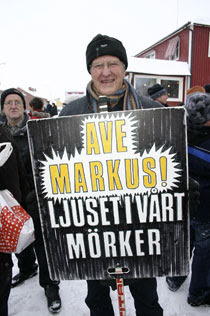Popular Music from Övertorneå

An ongoing news story from up here in Norbotten are the problems faced by Övertorneå, a town of about 5000 people along the border with Finland. The council refusing to pay its electricity bills, so all the streetlights are turned off and the whole town is plunged into darkness. The houses have power, but there is no public lighting. And with such little snow at the moment, it is very dark up there, not to mention unsafe. As a stopgap measure the council has bought yellow safety vests and hiker's lights on headbands for the schoolchildren.
As far as I am aware, the story goes back generations (as such things can in small villages), to the town's wealthiest family and the current patriarch who is particularly unhappy with the local government. He has gone so far as to put up signs around the town equating the Social Democrat government with the Nazis. (BTW there are a lot interesting stories relating to Nazi's up here in the north, but that's for another time).
Widely considered to be a nutcase, this guy ends up owning the sole rights to distribute electricity to the town, after reforms aimed at privatising and introducing 'competition' to the electricity market blah blah blah. This year he hiked up the prices by about 50%, $200,000 AUD which the council says is ridiculous and can't and won't pay. That was in September, and since then he has basically turned off the streetlights. The darkness extends down to Haparanda about 70km south. At least the first court case has ruled that the guy hasn't done anything illegal, so they have no right to intervene.

Övertorneå lies in the Tornedalen (Torne Valley) region, where the Torne river forms part of the border with Finland. This region is basically the furthest from 'civilisation' (ie Stockholm, as far as most southern Swedes are concerned), and therefore doesn't make it into the news very often. It is an area populated by small villages, dominated by forests, and is too close to Finland for most people's comfort; though the easy access to lower-taxed spirits, diesel and other goods means the border is often crossed by Norbottningens on shopping sprees. And of course now Haparanda has Ikea. But folk from that region (and there qre quite a few here at the uni) are quite embarassed that when it does make it to the news, it becomes a national joke.
One of the biggest splashes the Tornedalen region made into the Swedish conciousness was a few years ago with the book by local boy Mikael Niemi called Populärmusik från Vittula. The book was massive hit in Sweden, and the English version received good reviews. Here is the one from the NY Times . The story is centered around a boy growing up in a village in the 60's, when rock music was just seeping its way northward, along with paved roads and whitegoods. It is a lighthearted book, full of little vignettes and stories of village life that despite me not really experiencing it myself, seem very authentic from what I have seen around here. There is a very strong sense of pride in the Tornedalenese, and a sense of being separate. An excerpt from the NY Times review:
''We spoke with a Finnish accent without being Finnish, and we spoke with a Swedish accent without being Swedish. We were nothing. There was only one way out. Only one possibility if you wanted to be something, no matter how insignificant. You had to live somewhere else,'' Niemi writes. This could be the setup for yet another novel about an eager young rube seeking his fortune in the metropolis. But for the most part, Niemi's characters don't even venture to Stockholm, let alone London or New York. Instead, they grow up in a rural community that is being transformed by the new economic realities of the Swedish welfare state and by the distant rumblings of a nascent global youth culture.
More info: http://www.amazon.com/Popular-Music-Vittula-Mikael-Niemi/dp/1583226591
If you see it on the shelves, I highly recommend it. I haven't had a good read through the English translation which I had on my bedstand for emergencies, but from what I did read it does catch the spirit of the writing. There are quite a few brittish-isms like 'kaboodle' that gets used alot, and the odd mistranslation of of 'armholes' in Swedish to 'armholes' in English ('armpits', anyone?),
The life and character of the village and its people are well described. How do you define manliness (or its opposite: knapsu)? Owning and looking after a car is manly, but cleaning is women's work, so what about cleaning the car? The classic scene though is when he gets 'the father and son talk',and instead of the birds and bees gets a list to memorise, of girls he cant touch because secretly they are cousins, of the generations-old feuds and grievances and alliances and who owes whom, who were communists, nazis, strike-breakers etc.
Another famous contribution to Swedish culture from this region is a cocktail from the town of Pajala (where Vittula is located): the famed Pajala Sunrise - a tall glass of homemade moonshine with a slice of cold falukorv sausage on the rim. To 'class it up' a little, when ordering in a trendy Stockholm bar, you can ask for the sausage to be grilled.
But there is some good news, some light in the darkness, if you will: Övertorneå has a new hero - Markus Fagerval, the winner of Idol 2006. Apparently this is a big deal for them, not just because it will be a boost for the town, but because if they lynch the TV crews they can keep the lights and generators that have been brought up from Stockholm. But do they need them? As a placard said, "Congrats Markus, the light in our darkness". Aaaw.


0 Comments:
Post a Comment
<< Home